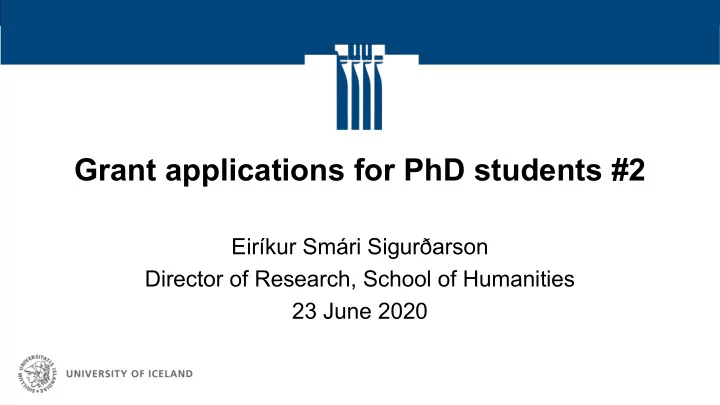

Grant applications for PhD students #2 Eiríkur Smári Sigurðarson Director of Research, School of Humanities 23 June 2020
On the presentation • Submit questions via chat: – I will answer during or after presentation, or after group work. • Send email to esmari@hi.is if you have serious problems (no sound etc.) 2
Overview over day one 1. Recap: Principles for writing grant applications 2. Impact and the value of research 3. Pathways to impact and work-plans 4. On peer-review 5. Group work: Why?
GRANT WRITING PRINCIPLES
Principles of application writing 1. Respect the objectives 4. Be convincing of the funder 5. Be personal 2. Focus on the future – 6. Approach application as what you are going to team work do 7. Shorten your speech 3. Approach as a much 8. Use simple language needed project
Approaching an application • Analyze and evaluate the funder: – What does the funder want? – Are there any explicit objectives with the funding programme? – Are the evaluation criteria published? What do they say? – Are older allocations published? Are they informative for what kinds of projects are preferred? – What kind of evaluation process is used? Who is going to read, evaluate and rank your application? • Respect the funder: – Answer all questions – Show respect for the funder’s priorities
Scientific value and state-of-knowledge • Clear focus from the start is crucial: What is this particular project about? – What is the one idea that glues the project together? – Why is it interesting and important? – What makes your proposal innovative? • Put in the context of the state-of-knowledge • Explain main value in broader terms than your narrow field of research • Questions: What? Why and why now? How?
IMPACT
What is impact? • Something changes, but what? • Often in terms of economy, technology or policy. • I.e. something that is measurable and demonstrable ! • But: This is a very narrow view.
Impact vs. Value • Impact: – Usually described in terms of change. – System changes from state A to state B. • Value: – Usually described with reference to overarching objectives like happiness or democracy.
Societal impact / value of research • Increasingly important aspect of applications and in evaluation criteria. – Iceland lagging behind to some degree. • Basic question: – What is “the good” of your research? • Will it – potentially – lead to any change in society? I.e. for the better? • Does it – potentially – have any value to society? I.e. positive value? – Not necessary to understand impact in terms of economic , technological or cultural change. More varied approaches also accepted.
Impact, not grimpact! • How do we identify the good ? • Increasingly popular: The Sustainable Development Goals. – University of Iceland and the Icelandic Government. – Many international funders and organisations.
COVID-19 • Universities and research institutes are mapping their contribution to COVID-19. • Popular in applications (in some of your short drafts as well!).
Alternative impacts • Epistemic justice • Empowerment • Perceptions • Capabilities • ...
PATHWAYS AND WORK-PLAN
Research plan and methodology • If you have an outline of your thesis-in-progress, consider using it as a frame. – Proposed chapter division can be a part of the grid for a time plan. • Focus on the research plan – but include main milestones in your PhD progress (defense of prospectus; final draft; research stays abroad …) • Methodology – be specific! – What sources and material will you work with? – Does it require team work or are you working individually? – How will you access it and work with it? – Are there any ethical problems, problems of access, …
Strategic choice • Project description and work-plan: • Separate chapter with work-plan – or • Intertwined with the project description
Pathways to impact • Route from research to society. – “Productive interactions”. • Assuming potential societal impact, how do you see the route from research to societal change? – Anything goes! (Almost) • Impact can be en route or after defence.
PEER-REVIEW
What is peer-review? • A peer: in this context = an equal. – Main idea: A scientist is best at evaluating the quality of the work of other scientists. – In your case: Not true! PhD students being evaluated by your superiors. • Next week: You will be evaluating each other.
Some principles • Understanding: What is the intention of the applicant? • Generosity: How can you help the applicant along? • Critique: What could be done better? • Note: Don’t impose your own views!
GROUP WORK
Group work • Discuss the why . – Why is your research interesting and important? – Is it going to change anything for the better? If so, for whom and how?
Final step • Before next week: – Write full 5 page proposal. – No later than Friday 26 June: email to esmari@hi.is • 30 June: – Peer-review of full proposals.
Recommend
More recommend